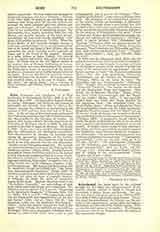

Kuhn, JOHANNES VON, theologian, b. at Waschenbeuren in Wurtemberg, February 19, 1806; d. at Tubingen, May 8, 1887. He pursued his classical studies at Gmund, Ellwangen, and Rottweil, and courses in philosophy and theology from 1825 to 1830 at Tubingen; entered the seminary at Rottenburg in the autumn of 1830, and was there ordained on September 14, 1831. In the autumn of 1832, he became professor of New Testament exegesis in the Catholic theological faculty then attached to the University of Giessen. At Easter, 1837, he was called in the same capacity to the University of Tubingen, where, in 1839, he was appointed to the chair of dogmatic theology. He retired in 1882. Kuhn was a clear thinker, with remarkable gifts for philosophical and theological speculation. With Staudenmaier he occupies the foremost rank among the speculative dogmatists of the Catholic school at Tubingen. His first important work was the result of his deep research into the new philosophy, “Jacobi and die Philosophie seiner Zeit. Ein Versuch das wissenschaftliche Fundament der Philosophic historisch zu erortern” (Mainz, 1834). During the years he taught at Giessen, his literary activity in the domain of New Testament studies resulted in a series of articles which he published in the “Jahrbucher fur Theologie and christliche Philosophie” (Frankfort, 1834-6), edited by him and by his colleagues, Locherer, Luft, and Staudenmaier. His work in this field closed with the important, though unfinished work, “Das Leben Jesu wissenschaftlich bearbeitet” (Mainz, 1838), in which he opposed the destructive tendencies of Strauss. After he had taken the chair of dogmatic theology at Tubingen, he made the study of speculative dogma his life work. His most important work is the “Katholische Dogmatik”, an undertaking of wide scope which unfortunately was never completed. The following parts appeared: Vol. I, part I: “Einleitung in die katholische Dogmatik” (Tubingen, 1846; 2nd ed., 1859); Vol. I, part II: “Die dogmatische Lehre von der Erkenntniss, den Eigenschaften and der Einheit Gottes” (1849; 2nd ed., 1862); Vol. II: “Die christliche Lehre von der gottlichen Dreieinigkeit” (1857). Kuhn had already outlined his work in the paper “Ueber Princip and methode der speculativen Theologie” (University program, Tubingen, 1840). Among his other works which were issued in part independently, and in part in the Tubingen “Theologische Quartalschrift”, many bear a polemical character. His treatment of the fundamental questions on the relation of faith and knowledge, of philosophy and theology, brought about a controversy first with the Hermesians, and in later years with the advocates of the neo-Scholastic philosophy (Clemens, Schazler). To the analysis of Hermesianism the work “Ueber Glauben and Wissen, mit Rucksicht auf extreme Ansichten and Richtungen der Gegenwart” (Tubingen, 1839), is partly devoted. The “Philosophie and Theologie” (Tubingen, 1860) was directed against the philosopher Franz Jacob Clemens of Bonn, as was also the essay, “Das Verhaltniss der Philosophic zur Theologie nach modern-scholastischer Lehre” (“Theologische Quartalschrift”, 1862, pp. 541-602; 1863, pp. 3-83).
In 1863 and the subsequent years, Kuhn was engaged in a controversy with Constantine von Schazler, first in regard to a free Catholic University and later on the dogmatic question of the relation of nature and grace, of the natural and the supernatural. On the former question he wrote “Die Historisch-politischen Blatter fiber eine freie katholische Universitat Deutschlands and die Freiheit der Wissenschaft” (Tubingen, 1863); on the latter he wrote “Das Natürliche and das Uebernattirliche” (Tubingen, 1864). Schazler then published his important work, “Natur and Ubernatur. Das Dogma von der Gnade and die theologische Frage der Gegenwart. Eine Kritik der Kuhn’schen Theologie” (Mainz, 1865), and later “Neue Untersuchungen fiber das Dogma von der Gnade” (Mainz, 1867). It was especially against these two works that Kuhn directed his last important book, “Die christliche Lehre von der gottlichen Gnade. Erster and allgemeiner Theil: Die ursprungliche Gnade and die damit zusammenhangenden Untersuchungen Tiber den Begriff and das Wesen der Gnade uberhaupt, mit besonderer Beziehung auf die Scholastik and deren neueste Umdeutung” (Tubingen, 1868). A prospective second volume, in which the grace of Redemption was to be set forth from a positive and theoretical standpoint, never appeared. Of Kuhn’s earlier works we may mention a few others, which are particularly serviceable against the Pantheistic, anti-Christian theories of contemporary philosophy: “Die moderne Speculation auf dem Gebiet der christlichen Glaubenslehre” (“Theologise he Quartalschrift”, 1842, pp. 171-225; 1843, pp. 3-75; 179-226; 405-67); “Die Schelling’sche Philosophic and ihr Verhaltniss zum Christenthum” (“Theologische Quartalschrift”, 1844, pp. 57-88; 179-221; 1845, pp. 3-39). Kuhn also opposed Hegel’s philosophy of religion in the above-mentioned “Ueber Glauben and Wissen” (1839).
FRIEDRICH LAIICHERT

